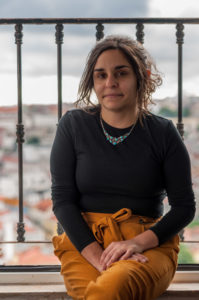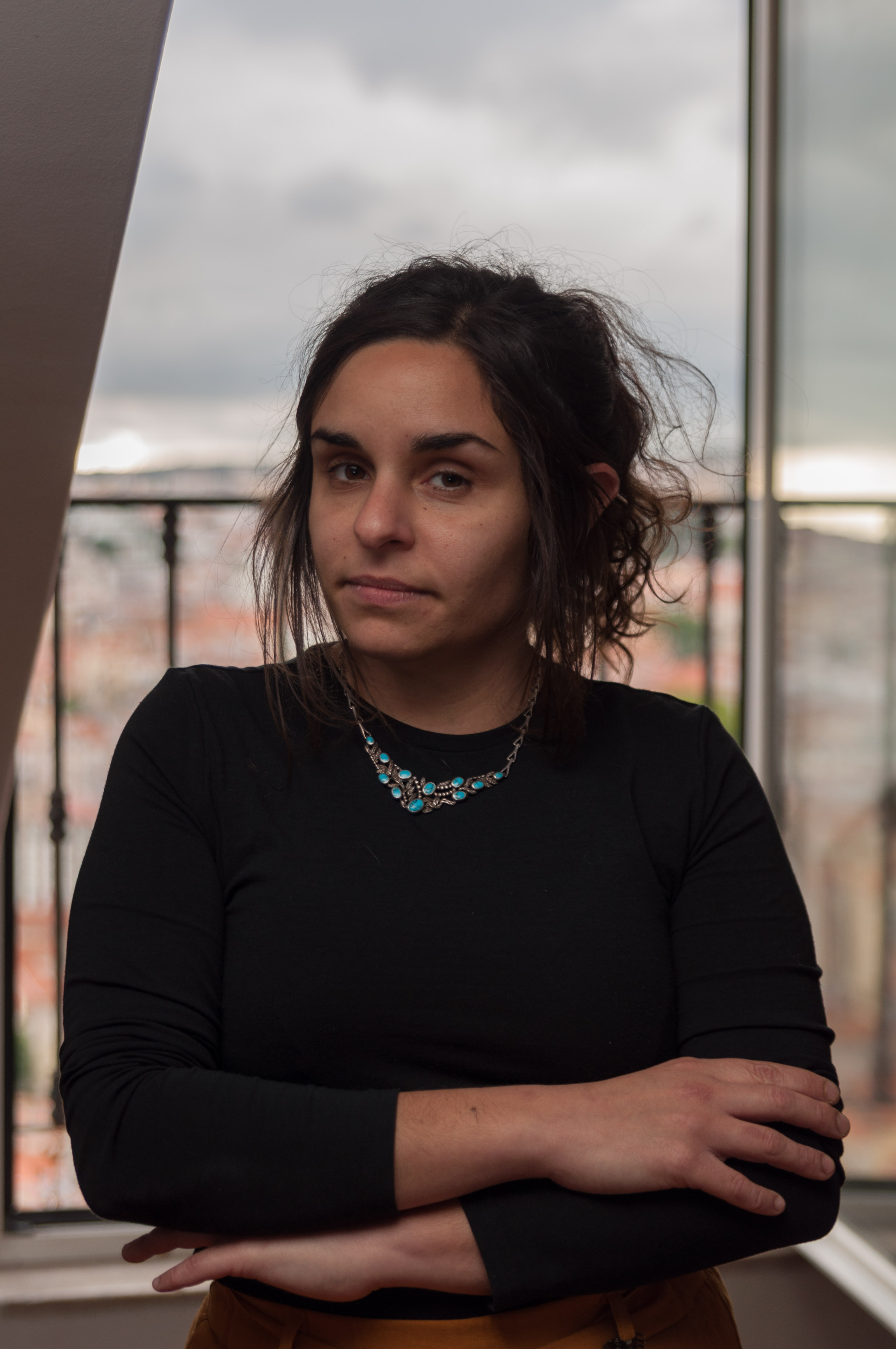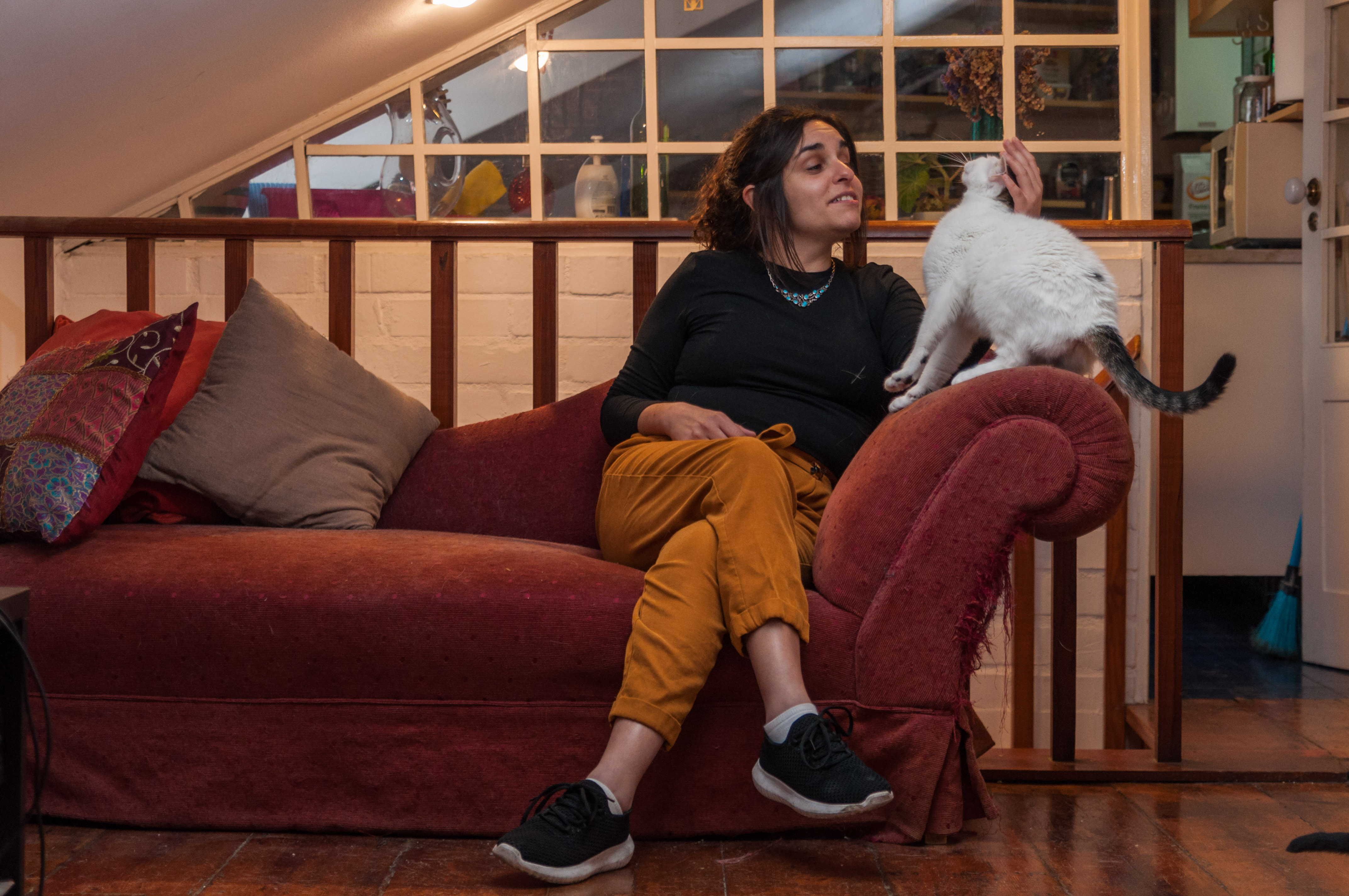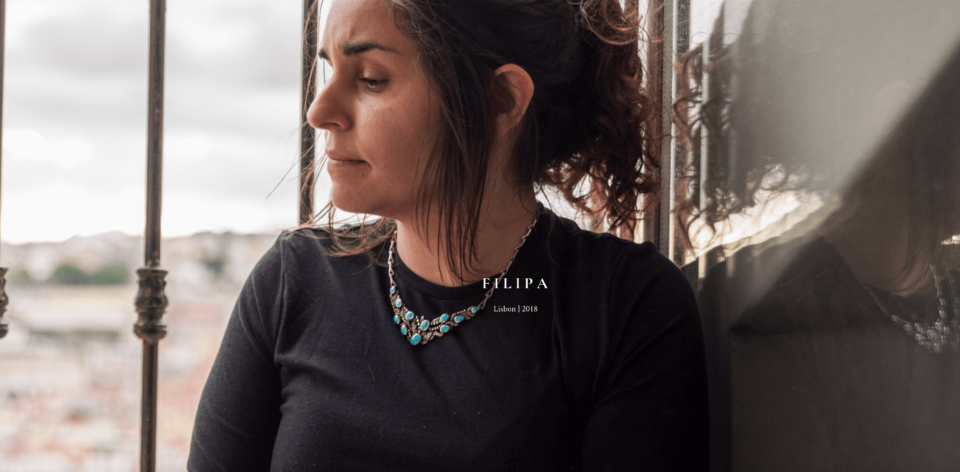F I L I P A
Lisbon | 2018

F I L I P A
City — Lisbon
Age — 31
Love life — Boyfriend
Profession — Cook, runs a school cafeteria
Years in Lisbon — 5
Location — Filipa’s house, at one of the highest points of the city
T H E L I S B O N S T O R I E S
‘IT BECOMES
HARDER TO
MAKE YOUR DREAMS
COME TRUE
IN LISBON’

- What makes you really happy?
“Baking cakes. Whenever you bake a cake, you’re part of a celebration. I always imagine the moment when someone is going to see the cake for the first time. Meeting new people makes me happy as well, I’m pretty chatty. I like to start conversations with random tourists, ask them about their life and what they like to eat. I think Portuguese people in general are really welcoming and like to show tourists around. Although four years ago, things changed a bit. Ever since there have been lots of tourists, and it’s been hell to ride the tram. Everyone who lives up the hill like me is upset that we have to wait in long lines and have to pay to be squeezed into that throng of tourists. We really need to use that tram to commute, not for sightseeing.”
- What makes you different than other people?
“Probably that I’m too goofy and naive sometimes. Nowadays, people don’t trust other people that much and I think I still do. It has a downside. I trusted my previous boss too much. We were going to open a new restaurant together, but he fired me and stole all the money we had saved and began his own restaurant. That was an enormous disappointment. I really believed in our idea. We never signed a contract, so I couldn’t sue him, but he will get his karma. This bad experience made me decide not to be so naive at work anymore, but I refuse to let it change me on a personal level. It’s a lesson learned.”
- What is your biggest struggle?
“That it becomes harder to make your dreams come true in Lisbon. My dream is to open a bakery with birthday cakes, but the city is getting too expensive to do it. Lisbon is not a place for average Portuguese people anymore. Someone from another country will probably get the place I want to rent or open a cake shop before I get the chance, because they have more money. All the prices went up when Lisbon became popular with tourists. Five years ago a bica, or Portuguese espresso, would be about fifty cents everywhere, nowadays we have to pay two euros just because a place looks nice. We used to have a beer every day at the viewpoint over the city, but we can’t afford it anymore. I can’t visit ninety percent of the restaurants I used to go to, because they are becoming too expensive. The rents doubled or tripled over the last two years. The Portuguese are deceiving other Portuguese with prices like these. Lisbon is not for locals anymore. Many of us choose to leave, but I think we should stay to make sure it doesn’t become a city just for the tourists or expats.” - What is your biggest life lesson?
“To not turn small things into a big drama, like a customer who is rude or flatmates who don’t clean the house. It can ruin your day and suck all the energy out you. Most of the time I later realise that it was a small problem and I shouldn’t have been that nervous or freak out that much. I am working on it, because it saves me half an hour of wasting my time bitching. Everyday life is stressful enough as it is.”

- What is your biggest sadness?
“Not having spent as much time with the ones I love as I could have. You really don’t know what you’ve got ‘till it’s gone. If I had known my sister would move to London and some other friends would move abroad, I would probably have spent more time with them. Another sadness is that I probably would have started my cooking career earlier if I would have known better. I’m sure that my dream business would have been up and running by now. I’ve started cooking school at 26 and in Portugal that’s really late, especially for a woman. The perfect candidate is an eighteen year old boy, whom every chef can shape into what they want for their restaurant. Being a woman is always an issue in Portugal. Some employers still think that women have less energy or suddenly leave because they want to have kids. It’s sad to say, but Portugal is still a patriarchal society. I feel I have to work harder than men. And whenever we had to work in a group at cooking school, the men would team up with each other and the women would be chosen last. They only relied on us for tasks like writing a paper. It’s just sad.” - What is the best thing that ever happened to you?
“Probably the change I had in my life for the last three years. I’ve become more independent. My life really changed when I met my boyfriend Matt and I moved in with him and with my best friend Antonio. Before that I was living with my family, because I couldn’t afford a place for myself. I didn’t want to move out, until I knew I could really do it. Leaving my parent’s house was the best turning point in my life ever, because it made me feel closer to my parents. We have a more grown-up relationship now. We talk about different things, like how hard it is to keep it all together, and they understand, without interfering. They acknowledge me in a different way now.” - What is the best advice someone ever gave you?
“My mom taught me to always stay humble and to be grateful, because then you’ll always be welcome to come back everywhere. I interpret being humble as respecting people, to collaborate rather than compete and not making waves if you don’t need to. I think people from Lisbon in general are self-aware and aware of others, they filter their words. Maybe that makes us seem less approachable than the people from Porto, who speak their minds completely, but I think people from Lisbon are doing great as well, haha.”
- What advice would you give other women in Europe?
“Just do what you want to do and do it in your own country. Loads of people are leaving their countries now because of the economic situation, but if everyone is leaving, who’s going to stay here and learn anything nice? If you have an OK life, you’ll be able to travel around anyway. Kids who are studying here at the university are already being promised a job abroad. I think you owe it to your country to at least try your hand here. Then if you have to leave after all, go.” - What can really hurt you?
“Probably when friends change. A few of my friends changed a lot. We had some really good times together, but some friends became bitter about life. They are not as open and friendly and close to me anymore. It hurts a bit. Their behaviour is not about me, but their bitterness changed our relationship.” - What is your biggest fear?
“Probably everybody’s biggest fear – ending up old and lonely. I don’t think I’m that good at being lonely, I like to see myself with people I like in the end. And if no one wants to be with you towards your final days, what have you done? Another fear is not having done everything I can to achieve my ultimate goal. But if I’ll never have my own bakery, I won’t be bitter about that, because at least I’ve tried, and I like what I am doing now. I make long hours, but it’s quite chill and less stressful than many other jobs in the world.” - What are you insecure about?
“I am super insecure about my cooking. I’m always looking at people’s faces when they’re eating my food. Do you like it, do you like it? I think every good cook is insecure and wants to cook better. It’s about finding the right balance between your ego and your confidence. When your ego is bigger than your skills, you are cooking for yourself and not for other people. But if you don’t have any confidence, everything will fall apart. You need to have swag to be a cook. Sometimes a glass of wine helps, or music in the kitchen, you need to feel that things are flowing. But at the same time you need to question yourself, so you stay sharp and on top of things.” - What does Lisbon mean to you?
“Everything. There is no light like this anywhere else in the world and the views are amazing. Lisbon gives me the feeling that this is my place, that you don’t need much to have fun here. It’s enough to just sit up in my window with a beer in my hand, watching people passing by.”
Photos by Luís Luz

